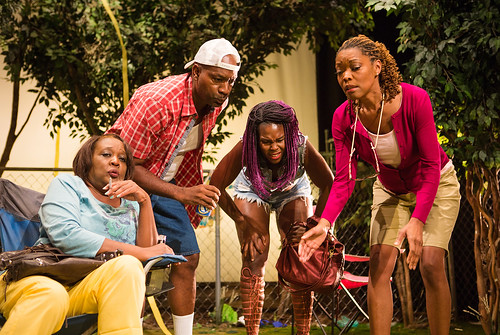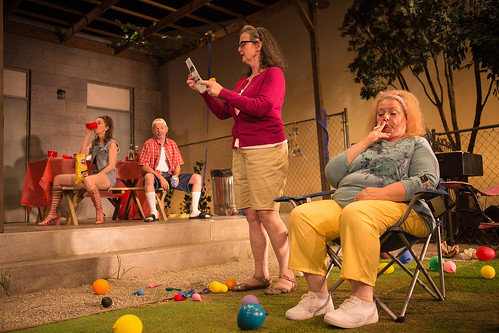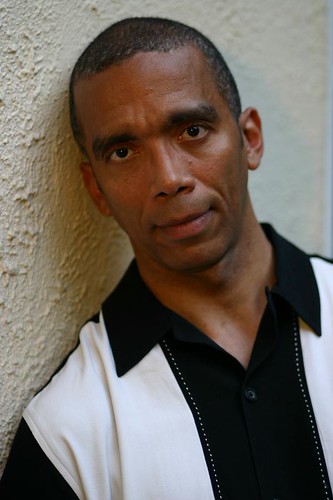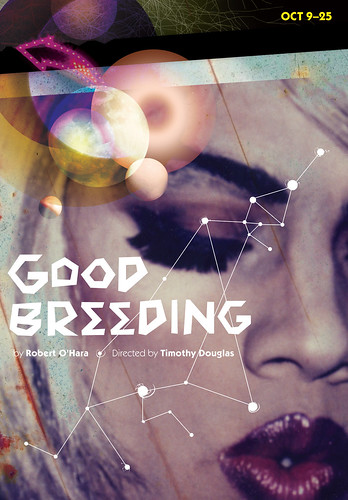
The cast of Robert O’Hara’s Barbecue at San Francisco Playhouse includes (from left) Edris Cooper-Anifowoshe as Adlean, Adrian Roberts as James T, Kehinde Koyejo as Marie and Halili Knox as Lillie Anne. Below: The clever, twisty play also includes cast members (from left) Teri Whipple as Marie, Clive Worsley as James T, Anne Darragh as Lillie Anne and Jennie Brick as Adlean. Photos by Ken Levin
Robert O’Hara is one of those playwright/directors who, when his name is attached to a project in any way, you pay attention. He’s smart, funny and has a keen eye for theatrical disruption. His Insurrection: Holding History may have played at American Conservatory Theater almost 20 years ago, but it remains one of the wildest, most wonderful things I’ve seen from that company.
O’Hara – the playwright – is back in town with Barbecue, the first show in San Francisco Playhouse’s 15th season, and here’s what’s on the grill: American families, race in America and recovery porn. This is comedy with deadly serious aim or drama with some really big laughs. Whatever it is, it’s almost indescribable, and that’s a good thing.
The one thing I will tell you, even though it would be better if you went into the play knowing nothing other than it was impeccably directed by Margo Hall and might elicit strong reactions from you on a number of fronts, is that O’Hara turns theater into a wacky mirror, almost literally. The subject is the O’Mallery family’s five (of seven) surviving siblings in a Midwestern city. They are a family plagued with addiction issues (alcohol, painkillers, marijuana, crack, control) and bad attitiudes. They don’t like each other much, but they love each other, and when sister Barbara needs an intervention to get her into rehab, the family rallies. Just like they’ve seen on TV reality shows, they stage a “barbecue party” in a local park in an attempt to lure her in.
But here’s the first of several twists you will encounter over the course of the play’s two hours: we see the O’Mallery’s as a white family in one scene and then as a black family in the next. Same characters, same situation, two sets of actors. When are we afforded the chance to challenge ourselves and our notions of how family and race and class are related? What does it say about me that I found the white family whiny and annoying while the black family was more interesting and likable and much funnier and more vivacious? (Perhaps the white family hit too close to home.)
If the whole play had only been ricocheting between the alternate families, that would have been fine by me, but O’Hara has more in mind here. These families are alternating reflections, but what exactly are they reflecting? That’s the real question, and O’Hara does provide answers. And twists. And a lot more fun and some quite serious thoughts on rehab and recovery and the language and culture we have built around that process.
There are some wild tonal shifts here, but director Hall has everything firmly in hand, with an excellent design team including Bill English (the superb outdoor park setting complete with restrooms that you know are on the verge of disgusting), Wen-Ling Lao (perfect lighting alteration to accommodate the play’s twists) and Brooke Jennings (pitch-perfect costumes on the cusp of reality/comedy). Usually when Hall is in the director’s chair, the only downside is that it means she won’t be on stage. But that’s not a problem with Barbecue. She is part of the excellent cast and all but ignites the second half alongside the also excellent Susi Damilano. The black/white scene flips, in addition to being culturally, comically and dramatically fascinating, offer a wonderful opportunity to see talented actors tackling the same roles at the same time.
The entire cast is tremendous, but it’s especially instructive to see the dramatic work of Anne Darragh and Halili Knox as Lillie Anne, the controlling sister who is attempting to pull off this intervention and get her difficult (and addled) siblings on board with her. They approach the character differently and offer different levels of empathy, and it’s extraordinary. On a more comic level, Edris Cooper-Anifowoshe and Jennie Brick as Adlean are both hilarious and, again, so different in the way they get laughs. One is more obnoxious and one is more lovable. The same is true of Clive Worsley and Adrian Roberts as brother James T and Teri Whipple and Kehinde Koyejo as Jack Daniels-swilling sister Marie.
If all of O’Hara’s twists don’t have the same potency, this cast pulls off this whole audacious enterprise beautifully and keeps the flames of Barbecue high and hot.
FOR MORE INFORMATION
Robert O’Hara’s Barbecue continues through Nov. 11 at San Francisco Playhouse, 450 Post St., San Francisco. Tickets are $20-$125. Call 415-677-9596 or visit www.sfplayhouse.org.


 And it just so happens that Douglas actually worked at the famously decadent Studio 54.
And it just so happens that Douglas actually worked at the famously decadent Studio 54.
 Oresteia is of course filled with murder and sacrifice, but Douglas insists there’s very little in the play he didn’t see going on at Studio 54. “I didn’t actually see murder, but I did see the bodies carried out,” he says. “Carried out the 53rd St. exit.”
Oresteia is of course filled with murder and sacrifice, but Douglas insists there’s very little in the play he didn’t see going on at Studio 54. “I didn’t actually see murder, but I did see the bodies carried out,” he says. “Carried out the 53rd St. exit.”